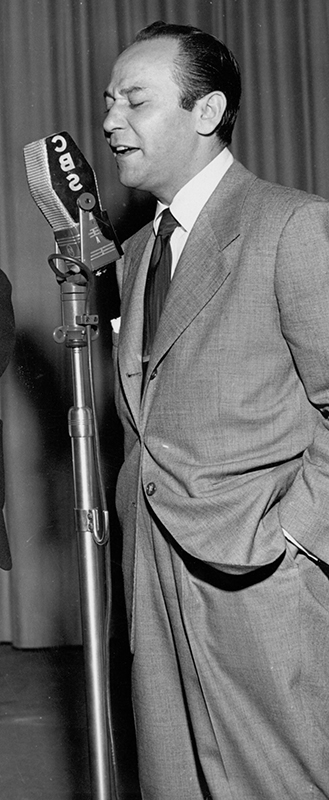Bio - Frank Loesser (original) (raw)
“Brother, you don’t know a nicer occupation, Matter of fact, neither do I.”
FRANK LOESSER (1910 – 1969) has been called the most versatile of all Broadway composers. Each of his five Broadway musicals: Where’s Charley?, Guys And Dolls, The Most Happy Fella, Greenwillow and How To Succeed In Business Without Really Trying, is endowed with its own unique sound and style.
Long before Broadway success, Loesser was known for the dozens of song hits from his days in Hollywood. He had supplied lyrics to the music of such greats as Jule Styne, Burton Lane, Hoagy Carmichael, and Arthur Schwartz, penning such songs as “I Don’t Want to Walk Without You,” “Two Sleepy People,” “Heart and Soul,” “They’re Either Too Young or Too Old,” and finally as composer/lyricist, “Spring Will Be a Little Late this Year,” “On a Slow Boat to China,” and his 1948 Academy Award winner, “Baby, It’s Cold Outside.”
Born June 29, 1910, in New York City, Loesser never studied music formally. His father was a distinguished teacher of classical piano and his older brother, Arthur, a renowned concert pianist, musicologist and music critic, but Frank refused to study the classics, favoring popular music, which his father disdained. Frank taught himself the harmonica and the piano in his early teens. He dropped out of college during the Depression, supporting himself with an array of jobs that included selling newspaper advertising and working as a process server and city editor of a short-lived newspaper in New Rochelle.
In the 1930’s, he teamed up with Irving Actman, contributing five songs to The Illustrator’s Show, which ran only 5 performances in 1936. But it was enough to land him a Hollywood contract with Universal, then Paramount, where he wrote his first hit song, “The Moon of Manakoora,” with Alfred Newman, for the film, The Hurricane in 1937. He would go on to write lyrics for over sixty films, including Destry Rides Again, College Swing, and Thank Your Lucky Stars.
In 1940, Frank made his official composing debut with the music (and lyric) for the title song of the Paramount film, Seventeen. World War II intervened and PFC Frank Loesser was assigned to Special Services, providing lyrics for army camp shows. Finding himself with no collaborator, Frank resumed his composing career with the war-time hit, “Praise the Lord and Pass the Ammunition.”
In 1948, producers Cy Feuer and Ernest Martin lured him back east to create a score for their musical version of Charley’s Aunt. Where’s Charley? became Frank’s first hit show, and with a score that included “Once in Love with Amy” and “Make a Miracle,” it proved that Frank was more than just a pop tune writer from Hollywood.
He followed this with one of the masterworks of musical theater, Guys and Dolls, which opened to rave reviews in 1950, winning the Tony Award for Best Musical. His score was lush with hits, including “A Bushel and a Peck,” “Luck Be a Lady,” and “Sit Down, You’re Rocking the Boat.”
Frank then took four years to write not only the score, but also the book for his next show, which he called an “extended musical comedy.” The Most Happy Fella, with the hit songs “Standing on the Corner” and “Big D,” opened in1956, and ran two years. It was the first show recorded in its entirety, released as a 3-disc set by Columbia Records.
Reluctant to repeat himself, he decided on a simple country fable, Greenwillow, for his next project. In spite of seven Tony nominations, and a score that included “Never Will I Marry,” it ran only 95 performances in 1960.
In 1961, Frank bounced back with How To Succeed In Business Without Really Trying, which won the Pulitzer Prize and seven Tony Awards, including Best Musical. It ran four years on Broadway, with “I Believe in You” and “Brotherhood of Man” among the hits from the score.
In the midst of his stage work, Frank returned to Hollywood and created one of his best loved scores for the film Hans Christian Andersen (1952), with such songs as** “Wonderful Copenhagen,” “The Inch Worm”** and “Thumbelina,” which was nominated for an Academy Award. In 1974, Tommy Steele starred in a long-running stage version at the London Palladium.
Loesser worked at an amazing pace, rarely sleeping more than four hours in a row. In the late 1940’s, he formed a music publishing company, Frank Music Corp., with a focus on developing new composers and lyricists, furthering the careers of Richard Adler, Jerry Ross and Meredith Willson, among others. Today Frank Music Corp. is part of Paul McCartney’s music publishing company, MPL Communications. The Loesser shows are licensed by Music Theater International, which Loesser developed as a subsidiary of Frank Music Corp.
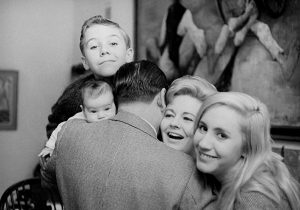
Frank Loesser with wife Jo and children
Frank was married twice, first to actress Lynn Loesser, with whom he had two children, Susan and John, then to The Most Happy Fella’s leading lady, Jo Sullivan, who gave him two daughters, Hannah and Emily. Loesser died of lung cancer on July 26, 1969, at the age of 59, in his beloved New York City.
The Loesser legacy lives on. There have been major revivals of The Most Happy Fella, both on Broadway and at the New York City Opera (added to their permanent repertory); Guys and Dolls won the 1992 Tony Award for Best Revival and ran three years, and was revived on Broadway again in 2008. The 1995 revival of How To Succeed in Business Without Really Trying starred Matthew Broderick, and became another long running hit. And it was a smash again when Daniel Radcliffe starred in a 2011 production.
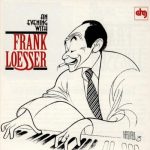 DRG has issued “An Evening with Frank Loesser,” a collection of previously unreleased demo recordings that Frank made for Guys and Dolls, The Most Happy Fella and How To Succeed… Koch Recordings followed this with “Frank Sings Loesser,” a collection of additional Loesser rarities.
DRG has issued “An Evening with Frank Loesser,” a collection of previously unreleased demo recordings that Frank made for Guys and Dolls, The Most Happy Fella and How To Succeed… Koch Recordings followed this with “Frank Sings Loesser,” a collection of additional Loesser rarities.
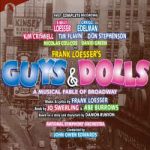
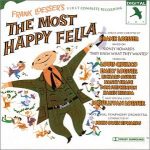 Jay Records has produced recordings of the complete scores of Guys and Dolls, starring Frank’s daughter, Emily, as Sarah, and The Most Happy Fella, with Louis Quilico and Emily Loesser.
Jay Records has produced recordings of the complete scores of Guys and Dolls, starring Frank’s daughter, Emily, as Sarah, and The Most Happy Fella, with Louis Quilico and Emily Loesser.
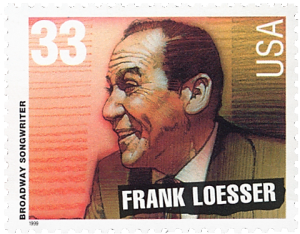 In 1999, Frank Loesser was honored by the U.S. Postal Service with a postage stamp bearing his likeness. A major biography written by Frank’s daughter, Susan Loesser, A Most Remarkable Fella , is available from Hal Leonard Corporation. In 2008, Yale University Press published an extensive examination of Loesser’s work by Thomas L. Riis as part of its Yale Broadway Masters series. The video documentary Heart and Soul: The Life and Music of Frank Loesser, produced by Walter Gottlieb in 2008, was seen on PBS stations throughout the country and released on DVD.
In 1999, Frank Loesser was honored by the U.S. Postal Service with a postage stamp bearing his likeness. A major biography written by Frank’s daughter, Susan Loesser, A Most Remarkable Fella , is available from Hal Leonard Corporation. In 2008, Yale University Press published an extensive examination of Loesser’s work by Thomas L. Riis as part of its Yale Broadway Masters series. The video documentary Heart and Soul: The Life and Music of Frank Loesser, produced by Walter Gottlieb in 2008, was seen on PBS stations throughout the country and released on DVD.
AWARDS
ACADEMY AWARD
Winner
1950 Best Music, Song
for: Neptune’s Daughter (1949)
– For the song “Baby, It’s Cold Outside”
Nominee
1942
Best Music, Song
for: Las Vegas Nights (1941)
Nomination shared with:
Louis Alter (music)
– For the song “Dolores”
Nominee
1944 Best Music, Song
for: Thank Your Lucky Stars (1943)
Nomination shared with:
Arthur Schwartz (music)
– For the song “They’re Either Too Young or Too Old”
Nominee
1948 Best Music, Song
for: Perils of Pauline, The (1947)
– For the song “I Wish I Didn’t Love You So”
Nominee
1953
Best Music, Song
for: Hans Christian Andersen (1952)
For the song “Thumbelina”
DOWNLOADS
WORK
FILMS
Blossoms on Broadway
Breezing Home
Buck Benny Rides Again
Cafe Society
Christmas Holiday
Cocoanut Grove
College Swing (aka Swing, Teacher, Swing)
Destry Rides Again
Devil’s Party, The
Flying Hostess
Freshman Year
Girl With Ideas, A
Glamour Boy (aka Hearts in Springtime)
Guys and Dolls
Hans Christian Andersen
Happy Go Lucky
Hawaiian Nights
How to Succeed in Business Without Really Trying
Johnny Apollo
Kiss the Boys Goodbye
Lady Fights Back, The
Las Vegas Nights (aka The Gay City)
Last Warning, The
Let’s Dance
Letter of Introduction
Man About Town
Man I Marry, The
Midnight Intruder
Moon Over Burma
Mysterious Crossing
Neptune’s Daughter
Night at Earl Carroll’s, A
On Our Merry Way (aka A Miracle Can Happen)
Perils of Pauline, The
Postal Inspector
Priorities on Parade
Quarterback, The
Red, Hot and Blue
Reported Missing
Roseanna McCoy
Sailors on Leave
St. Louis Blues (aka Best of the Blues)
Stolen Heaven
Sweater Girl
Thank Your Lucky Stars
That’s My Story
Three Smart Girls
Tornado
True to the Army
Variety Girl
When Love is Young
Where’s Charley?
Wildcatter, The
Yellowstone
Youth Will Be Served
